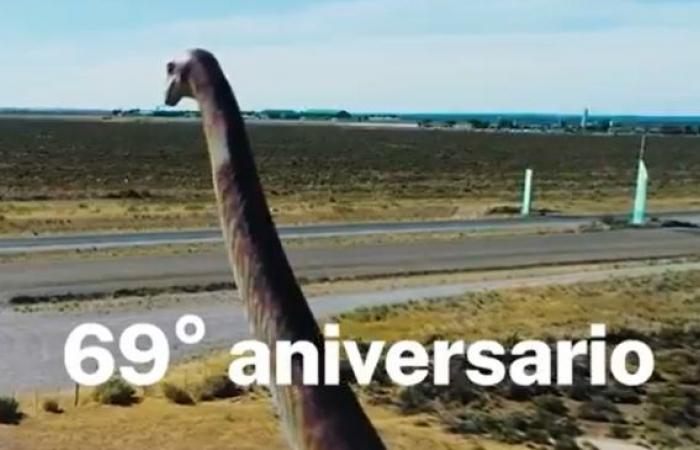This June 28 marks the 69th anniversary of the creation of the province in Playa Unión. The event is broadcast live on the Channel 7 screen.
In this regard, Governor Nacho Torres recalled on his X account “the creation of our province” and invited all Chubut residents to “celebrate it together”
“Because we are proud of our history, our land and our people, we are proud to be from here,” he said.
Meanwhile, on the Chubut Government’s social network they wrote: “Today we celebrate the 69th anniversary of the Creation of the Province of Chubut, which occurred on June 28, 1955.”
In this sense, they remembered “with gratitude” those who contributed to this important step in our identity and autonomy.”
“May this date inspire us to value our history, to continue building a prosperous future and to always honor our Chubut roots,” they concluded.
On the other hand, they shared a video and invited everyone to participate in the celebration that is currently taking place at the Municipal Gymnasium of Playa Unión, “Héroes de Malvinas”, José Hernández 799/899.
In the place there is a fair of artisans and producers from all over the province, a gastronomic patio, and a great musical closing starting at 9 p.m.
Finally, the Government recalled that entry is free.
A little history
The province of Chubut today celebrates its 69th anniversary since its creation as a provincial territory of the Argentine Republic, after the sanction signed on June 15, 1955 in the National Congress of Law No. 14,408 and promulgated by the National Executive Branch. A few days later, precisely on June 28, our province was created, canceling the so-called Comodoro Rivadavia Military Zone, established in 1944.
That June 28, General Juan Domingo Perón was the president of the Argentine Republic and Minister of the Interior was Ángel Gabriel Borlenghi.
By Decree Law No. 4,347 of April 26, 1957, the federal commissioners were empowered to call upon the people of the new province to elect the delegates who would proceed to dictate their constitutions.
Article 1 of Law No. 14,408
a) All national territories are declared provinces, in accordance with the provisions of articles 13 and 68, paragraph 14, of the national Constitution, with the limits expressed below:
b) Another province will be established, limited to the North by the 42nd South Parallel; to the East by the Atlantic Ocean; to the West, with the dividing line with the Republic of Chile and to the South, with the 46° parallel.
Chubut is a territory that has witnessed various waves of immigration and settlements, notably the presence of Welsh settlers. These immigrants played a fundamental role in the development of the region since their arrival in 1865. Before the arrival of Europeans, native peoples, such as the Tehuelches, lived and hunted in these territories, but they were dramatically affected by the Desert Campaign in XIX century.
On July 28, 1865, a group of 153 Welsh immigrants landed in Golfo Nuevo, today known as Puerto Madryn. Coming from various counties in Wales, these settlers traveled aboard the ship Mimosa, carrying with them what they needed to settle in a new territory and practice agriculture. Adapting to the unknown conditions of the local climate and geography was a challenge, especially the need to find fresh water. This effort took them to the Chubut River, where they founded the town of Rawson, in honor of Guillermo Rawson, who helped them settle in Patagonia.
Welsh settlers were looking for a place where they could practice their faith, speak their language and maintain their traditions. Patagonia offered them that opportunity. Their presence also contributed to affirming Argentine sovereignty in a strategically important region. The Welsh community in Rawson, and later in other areas of the lower Chubut River valley, prospered thanks to the construction of irrigation canals, one of the first artificial irrigation networks in Argentina, which allowed the large-scale cultivation of wheat.
Between 1874 and 1876, new groups of Welsh settlers arrived in the region, expanding the colony. The construction of a railway in 1886 that connected the valley with Puerto Madryn facilitated the marketing of agricultural products. This led to the emergence of Trelew and the growth of other communities such as Gaiman, which became a center of great productive activity.
In 1884, Rawson was designated the capital of the territory of Chubut and Colonel Luís Jorge Fontana was appointed as its first governor. Expansion continued westward with the establishment of farming communities at Dolavon and 28 de Julio.
In the 1880s, the Welsh also colonised the mountainous region of Chubut, settling in the 16 de Octubre Valley, where Trevelin was founded. By 1902, this community was already growing cereals, raising livestock, and had established its chapel and school.
A key moment in the history of the Welsh settlers was the 1902 plebiscite, when the Chilean government claimed the 16 de Octubre Valley. The Welsh inhabitants declared their loyalty to Argentina, and their opinion was decisive in the English arbitrator recognising Argentine sovereignty over the territory. This event was a testament to the integration and patriotism of the Welsh settlers in their new homeland.
The legacy of the Welsh settlers in Chubut is evident in the culture, architecture, and traditions that still persist in the region. Towns such as Gaiman, Trelew, and Trevelin retain a strong Welsh identity, with festivals, chapels, and tea houses that are living testimony to the heritage of these early immigrants. The history of the Welsh in Chubut is an important chapter in the cultural and social formation of the province, notable for its contribution to economic development and the affirmation of Argentine sovereignty in Patagonia.
Info from Patagonia.com.ar.


